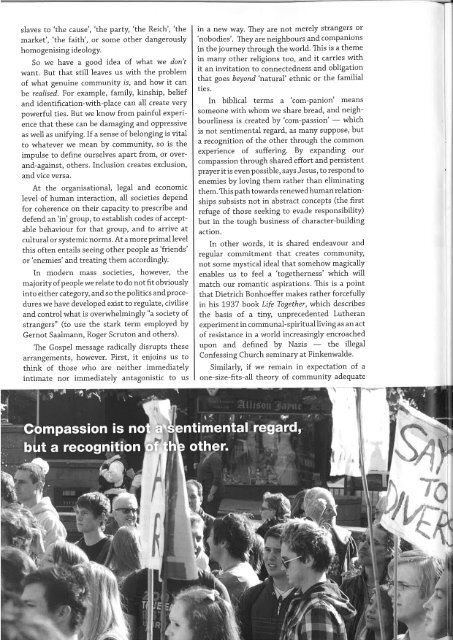Movement 134
You also want an ePaper? Increase the reach of your titles
YUMPU automatically turns print PDFs into web optimized ePapers that Google loves.
slaves to 'the cause', 'the party, 'the Reich', 'the<br />
market', 'the faith', or some other dangerously<br />
homogenising ideology.<br />
So we have a good idea of what we don't<br />
want. But that still leaves us with the problem<br />
of what genuine community is, and how it can<br />
be realised. For example, family, kinship, belief<br />
and identification-with-place can all create very<br />
powerful ties. But we know from painful experience<br />
that these can be damaging and oppressive<br />
as well as unifying. If a sense of belonging is vital<br />
to whatever we mean by community, so is the<br />
impulse to define ourselves apart from, or overand-against,<br />
others. Inclusion creates exclusion,<br />
and vice versa.<br />
At the organisational, legal and economic<br />
level of human interaction, all societies depend<br />
for coherence on their capacity to prescribe and<br />
defend an 'in' group, to establish codes of acceptable<br />
behaviour for that group, and to arrive at<br />
cultural or systemic norms. At a more primallevel<br />
this often entails seeing other people as 'friends'<br />
or'enemies' and treating them accordingly.<br />
In modern mass societies, however, the<br />
majority of people we relate to do not fit obviously<br />
into either c ategory,and so the politics and procedures<br />
we have developed exist to regulate, civilise<br />
and control what is overwhelmingly "a society of<br />
strangers" (to use the stark term employed by<br />
Gernot Saalmann, Roger Scruton and others).<br />
The Gospel message radically disrupts these<br />
arrangements, however. First, it enjoins us to<br />
think of those who are neither immediately<br />
intimate nor immediately antagonistic to us<br />
in a new way. They are not merely strangers or<br />
'nobodies'. They are neighbours and companions<br />
in the journey through the world. This is a theme<br />
in many other religions too, and it carries with<br />
it an invitation to connectedness and obligation<br />
that goes beyond'natural' ethnic or the familial<br />
ties.<br />
In biblical terms a 'com-panion' means<br />
someone with whom we share bread, and neighbourliness<br />
is created by'com-passion'<br />
- which<br />
is not sentimental regard, as many suppose, but<br />
a recognition of the other through the common<br />
experience of suffering. By expanding our<br />
compassion through shared effort and persistent<br />
prayeritis evenpossible, says Jesus, to respondto<br />
enemies by loving them rather than eliminating<br />
them. This path towards renewedhuman relationships<br />
subsists not in abstract concepts (the first<br />
refuge of those seeking to evade responsibility)<br />
but in the tough business of character-building<br />
action.<br />
In other words, it is shared endeavour and<br />
regular commitment that creates community,<br />
not some mystical ideal that somehow magically<br />
enables us to feel a 'togetherness' which will<br />
match our romantic aspirations. This is a point<br />
that Dietrich Bonhoeffer makes rather forcefully<br />
in his 1937 bookLifeTogether, which describes<br />
the basis of a tiny, unprecedented Lutheran<br />
experiment in communal-spiritualliving as an act<br />
of resistance in a world increasingly encroached<br />
upon and defined by Nazis the illegal<br />
Confessing Church seminary at Finkenwalde.<br />
Similarly, if we remain in expectation of a<br />
one-size-fits-all theory of community adequate<br />
\---<br />
li<br />
l

















